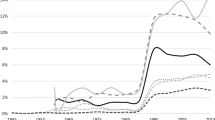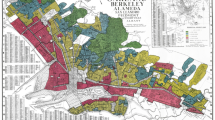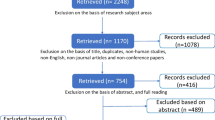Abstract
Urban living is often thought to promote incivility, but the existing sociological evidence paints a mixed picture. We aimed to examine the urban incivility phenomenon from an evolutionist’s perspective. Small communities are expected to show a higher incidence of helping because the applicability of theories such as kin selection, direct reciprocity and indirect reciprocity to acts of cooperative behaviour is augmented in small-scale demographic settings. Smaller communities have a reduced total pool of individuals to interact with, increasing the likelihood of encountering any given individual multiple times. This makes it easier for individuals to form cooperative relationships with one another, which may facilitate prosociality within smaller communities. Using the lost letter technique, our results show that city dwelling, compared with rural residence, per se does not negatively influence prosociality. This contradicts the expected erosion of cooperative behaviour in anonymous cities and adds to our understanding of the interplay between human macroecology and individual behavioural tendencies.
Similar content being viewed by others
References
Alesina, A., & La Ferrara, E. (2002). Who trusts others? Journal of Public Economics, 85(2), 207–234.
Alexander, R. D. (1987). The biology of moral systems. Carmel, IN: Hawthorne.
Amato, P. R. (1981). Urban-rural differences in helping: behavior in Australia and the United States. The Journal of Social Psychology, 114(2), 289–290.
Amato, P. R. (1983). Helping behavior in urban and rural environments: field studies based on a taxonomic organization of helping episodes. Journal of Personality and Social Psychology, 45(3), 571–586.
Australian Bureau of Statistics 2013, Census of population and housing: socio-economic indexes for areas (SEIFA), Australia, 2011, cat. no. 2033.0.55.001, ABS, Canberra. Available from: http://www.abs.gov.au/AUSSTATS/abs@.nsf/DetailsPage/2033.0.55.0012011?OpenDocument. [7 May 2016].
Australian Bureau of Statistics 2014, IRSAD, Australian Government. Available from: http://www.abs.gov.au/ausstats/abs@.nsf/Lookup/2033.0.55.001main+features100042011/ [9 May 2016].
Bates, D., Maechler, M., Bolker, B., & Walker, S. (2015). Fitting linear mixed effects models using lme4. Journal of Statistical Software, 67, 1–48.
Buchan, N. R., Grimalda, G., Wilson, R., Brewer, M., Fatas, E., & Foddy, M. (2009). Globalization and human cooperation. Proceedings of the National Academy of Sciences, 106(11), 4138–4142.
Forbes, G. B., & Gromoll, H. F. (1971). The lost letter technique as a measure of social variables: some exploratory findings. Social Forces, 50(1), 113–115.
Gintis, H. (2003). Solving the puzzle of prosociality. Rationality and Society, 15(2), 155–187.
Goldman, M., Lewandowski, H. E., & Carrill, R. E. (1982). Altruistic behavior in rural and urban, residential and business areas. Basic and Applied Social Psychology, 3(2), 155–160.
Grueter, C. C., Ingram, J. A., Lewisson, J. W., Bradford, O. R., Taba, M., Coetzee, R. E., & Sherwood, M. A. (2016). Human altruistic tendencies vary with both the costliness of selfless acts and socioeconomic status. PeerJ, 4, e2610.
Grueter, C. C., Westlake, G., & Coall, D. in prep. Absence of intergroup discrimination in a naturalistic helping task.
Hamilton, W. D. (1964a). The genetical evolution of social behaviour I. Journal of Theoretical Biology, 7, 1–16.
Hamilton, W. D. (1964b). The genetical evolution of social behaviour II. Journal of Theoretical Biology, 7, 17–52.
Hansson, R. O., & Slade, K. M. (1977). Altruism toward a deviant in city and small town. Journal of Applied Social Psychology, 7(3), 272–279.
Hill, K., Barton, M., & Hurtado, A. M. (2009). The emergence of human uniqueness: characters underlying behavioral modernity. Evolutionary Anhropology, 18, 187–200.
Hill, J. M., Jobling, R., Pollet, T. V., & Nettle, D. (2014). Social capital across urban neighborhoods: a comparison of self-report and observational data. Evolutionary Behavioral Sciences, 8(2), 59–69.
Holland, J., Silva, A. S., & Mace, R. (2012). Lost letter measure of variation in altruistic behaviour in 20 neighbourhoods. PLoS One, 7, e43294.
Kammann, R., Thomson, R., & Irwin, R. (1979). Unhelpful behavior in the street: city size or immediate pedestrian density? Environment and Behavior, 11(2), 245–250.
Korte, C. (1980). Urban-nonurban differences in social behavior and social psychological models of urban impact. Journal of Social Issues, 36(3), 29–51.
Korte, C., & Kerr, N. (1975). Response to altruistic opportunities in urban and nonurban settings. The Journal of Social Psychology, 95(2), 183–184.
Korte, C., Ypma, I., & Toppen, A. (1975). Helpfulness in Dutch society as a function of urbanization and environmental input level. Journal of Personality and Social Psychology, 32(6), 996–1003.
Lamba, S., & Mace, R. (2011). Demography and ecology drive variation cooperation across human populations. Proceedings of the National Academy of Sciences, 108, 14426–14430.
Latané, B., & Darley, J. M. (1970). The unresponsive bystander: why doesn’t he help? New York: Appleton-Century-Crofts.
Levine, R. V., Martinez, T. S., Brase, G., & Sorenson, K. (1994). Helping in 36 US cities. Journal of Personality and Social Psychology, 67(1), 69–82.
Levine, R. V., Reysen, S., & Ganz, E. (2008). The kindness of strangers revisited: a comparison of 24 US cities. Social Indicators Research, 85(3), 461–481.
Milgram, S. (1970). The experience of living in cities. Science, 167(3924), 1461–1468.
Nettle, D., Colléony, A., & Cockerill, M. (2011). Variation in cooperative behaviour within a single city. PLoS One, 6, e26922.
Nowak, M. A., & Sigmund, K. (2005). Evolution of indirect reciprocity. Nature, 437, 1291–1298.
Palmer, C. T. (1991). Kin-selection, reciprocal altruism, and information sharing among Maine lobstermen. Ethology and Sociobiology, 12(3), 221–235.
Pepper, G. V., & Nettle, D. (2017). The behavioural constellation of deprivation: causes and consequences. Behavioral and Brain Sciences, 40, e314.
R Core Team. (2014). R: a language and environment for statistical computing. Vienna, Austria: R Foundation for Statistical Computing.
Reysen, S, and Levine RV. (2014). People, culture, and place: How place predicts helping toward strangers. In Rentfrow PJ (ed.), Geographical Psychology, pp. 241–60. Washington, DC: American Psychology Association.
Sampson, R. J., Raudenbush, S. W., & Earls, F. (1997). Neighborhoods and violent crime: a multilevel study of collective efficacy. Science, 277, 918–924.
Silva, A. S., & Mace, R. (2014). Cooperation and conflict: field experiments in Northern Ireland. Proceedings of the Royal Society of London B: Biological Sciences, 281(1792), 20141435.
Smith, D., Dyble, M., Thompson, J., Major, K., Page, A. E., Chaudhary, N., Salali, G. D., Vinicius, L., Migliano, A. B., & Mace, R. (2016). Camp stability predicts patterns of hunter-gatherer cooperation. Royal Society Open Science, 3(7), 160131.
Steblay, N. M. (1987). Helping behavior in rural and urban environments: a meta-analysis. Psychological Bulletin, 102(3), 346–356.
Trivers, R. L. (1971). The evolution of reciprocal altruism. The Quarterly Review of Biology, 46, 35–57.
Westlake, G., Coall, D., & Grueter CC. submitted. Educational attainment fosters unconditional helping behavior: a natural experiment.
Author information
Authors and Affiliations
Corresponding author
Ethics declarations
Ethics was granted by the Human Research Ethics Community in accordance with the National Statement on Ethical Conduct in Human Research (National Health and Medical Research Council 2015; reference number RA/4/1/8257).
Conflict of Interest
The authors declare that there is no conflict of interest.
Additional information
Publisher’s Note
Springer Nature remains neutral with regard to jurisdictional claims in published maps and institutional affiliations.
Rights and permissions
About this article
Cite this article
Grueter, C.C., Westlake, G. & Coall, D. Urban Civility: City Dwellers Are Not Less Prososcial Than Their Rural Counterparts. Evolutionary Psychological Science 6, 14–19 (2020). https://doi.org/10.1007/s40806-019-00206-z
Published:
Issue Date:
DOI: https://doi.org/10.1007/s40806-019-00206-z




